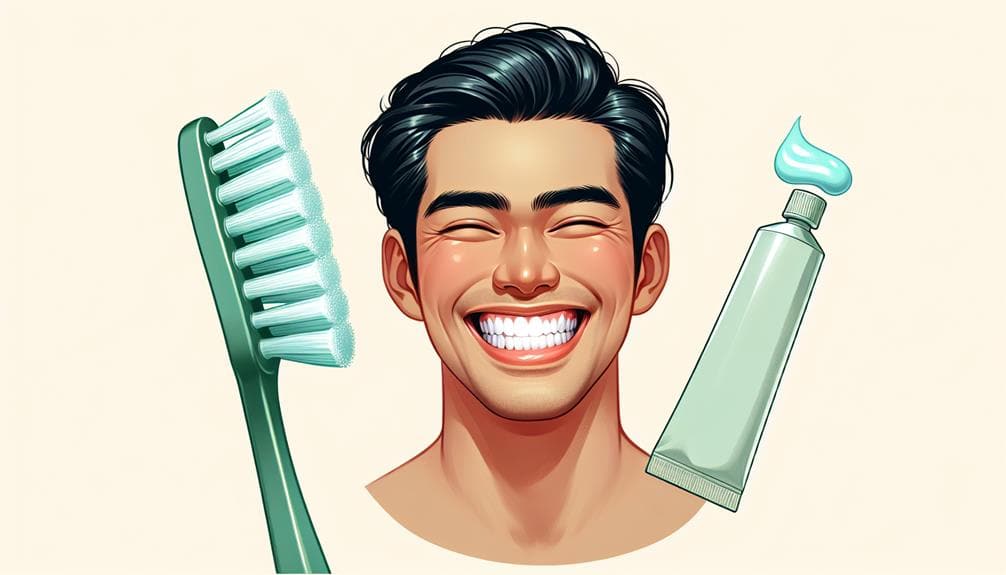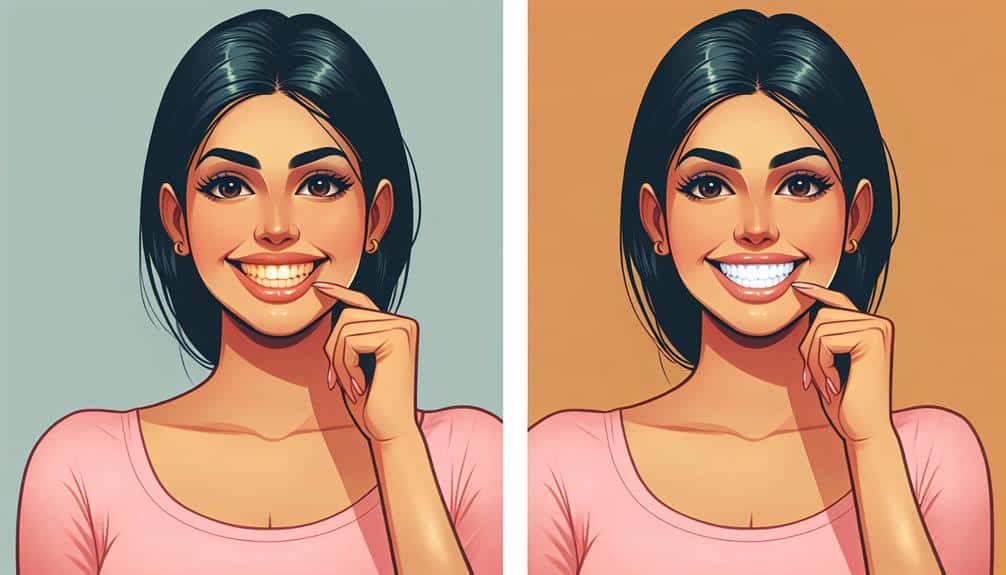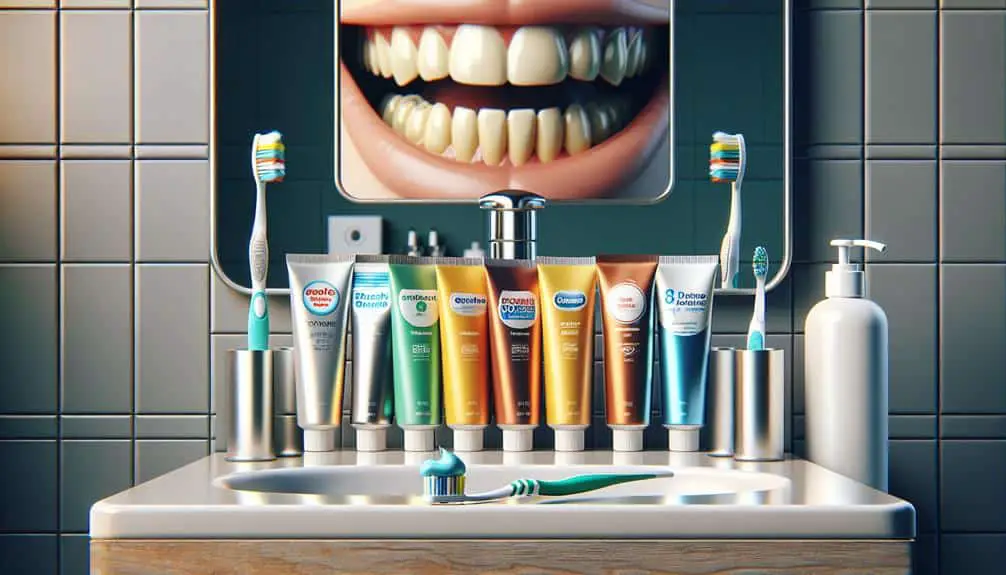Achieve a brighter smile by reducing consumption of dark beverages like coffee and wine that can stain your teeth. Opt for lighter-colored drinks and prioritize good oral hygiene habits. Consult with a dental professional for immediate whitening options like laser treatments or in-office bleaching tailored to your needs. Implement at-home remedies such as baking soda or whitening toothpaste for mild discoloration, but remember consistency is key for visible results. Maintain whiter teeth by brushing twice daily, flossing regularly, and scheduling routine dental check-ups. These expert tips are just the beginning of your journey to whiter, brighter teeth.
Key Points
- Limit consumption of dark-colored beverages like coffee and red wine.
- Maintain good oral hygiene with regular brushing and flossing.
- Consult a dental professional for personalized whitening options.
- Use whitening toothpaste and at-home remedies consistently.
- Avoid foods that stain teeth and opt for a balanced diet rich in fruits and vegetables.
Causes of Yellow Teeth
Yellow teeth can be caused by various factors, including lifestyle habits and certain foods. Dietary habits play a significant role in the color of your teeth. Consuming large amounts of dark-colored beverages like coffee, tea, and red wine can stain your teeth over time. Additionally, acidic foods and drinks can erode tooth enamel, making the underlying yellow dentin more visible. Genetics also play an important role in tooth color. Some people may naturally have thicker or more translucent enamel, which can affect the appearance of their teeth.
To combat yellow teeth caused by dietary habits, consider reducing your intake of staining foods and beverages. Opt for lighter-colored drinks like white wine or clear sodas, and be sure to drink plenty of water to help wash away staining particles. Maintaining a good oral hygiene routine, including regular brushing and flossing, can also help prevent yellowing. If genetics are a contributing factor, professional whitening options may be necessary to achieve a whiter smile.
Professional Whitening Options
When considering professional whitening options for your teeth, it's essential to consult with a dental professional to determine the most suitable treatment for your specific needs. Professional whitening options often offer more immediate and dramatic results compared to at-home remedies. Two common professional whitening methods include laser treatment and cosmetic dentistry procedures.
Laser treatment is a popular option in cosmetic dentistry for teeth whitening. This procedure involves the use of a laser to enhance the effectiveness of the whitening agent applied to your teeth. The laser helps in activating the whitening agent, allowing it to penetrate the teeth more effectively, resulting in a brighter smile.
Cosmetic dentistry procedures, such as in-office bleaching treatments, are performed by dental professionals to whiten teeth. These treatments are tailored to your specific needs and may involve a combination of techniques to achieve optimal results. Consulting with a dental professional will help determine which professional whitening option is best suited for you.
At-Home Whitening Remedies
Considering exploring at-home whitening remedies can be a convenient and cost-effective way to enhance the brightness of your teeth. Natural remedies offer a gentle approach to teeth whitening, with options like baking soda and hydrogen peroxide mixtures or activated charcoal. These remedies work by gently removing surface stains without causing damage to the enamel.
DIY solutions, such as homemade whitening toothpaste or oil pulling with coconut oil, can also help brighten your smile. Remember, consistency is key when using at-home remedies, as results may take time to show. It's crucial to follow instructions carefully to avoid any adverse effects and to consult with your dentist before trying any new whitening method, especially if you have sensitive teeth or existing dental issues.
While at-home remedies can be effective for mild discoloration, it's important to manage expectations and understand that professional treatments may be required for more stubborn stains.
Prevention of Yellowing
To prevent the yellowing of your teeth, maintaining good oral hygiene habits is crucial. Consistent care and preventive measures can help preserve the natural whiteness of your teeth. Here are some expert tips to help you prevent yellowing:
- Brushing and Flossing: Make sure to brush your teeth at least twice a day and floss daily to remove plaque and prevent staining.
- Regular Dental Check-ups: Schedule routine dental cleanings to remove tartar buildup and catch any issues early on.
- Dietary Changes: Limit foods and beverages that can stain your teeth, such as coffee, tea, red wine, and berries. Opt for a balanced diet rich in fruits and vegetables to promote overall oral health.
Maintaining Whiter Teeth
Maintain the whiteness of your teeth by incorporating whitening toothpaste into your daily oral care routine. Whitening toothpaste contains mild abrasives or chemicals that help remove surface stains, preventing yellowing and keeping your teeth as white as possible. In addition to using whitening toothpaste, paying attention to your dietary habits can also contribute to maintaining whiter teeth. Limiting foods and drinks that are known to stain teeth, such as coffee, tea, red wine, and berries, can help preserve the brightness of your smile.
Consistent oral hygiene is key to keeping your teeth white. Brushing your teeth at least twice a day and flossing daily not only helps prevent cavities and gum disease but also removes plaque and stains that can lead to yellowing. Regular dental check-ups and professional cleanings are essential to address any potential issues early on and maintain the whiteness of your teeth. By combining proper oral care practices with mindful dietary choices, you can effectively maintain the whiteness of your teeth and enjoy a brighter, healthier smile.
Frequently Asked Questions
Can Certain Medications or Medical Conditions Cause Yellowing of Teeth?
Certain medications and medical conditions can indeed cause yellowing of teeth. Medication effects and underlying health issues like certain diseases or treatments may contribute to changes in tooth color. Seek advice from a healthcare provider for guidance.
Are There Any Natural Remedies That Can Help Whiten Yellow Teeth?
Brighten yellow teeth naturally with oil pulling and baking soda. Embrace the power of turmeric paste and activated charcoal. These remedies may help whiten your teeth, revealing a brighter, healthier smile.
How Often Should I Get Professional Whitening Treatments to Maintain White Teeth?
For maintaining white teeth, professional whitening treatments should be done periodically. Touch-ups may be needed every 6-12 months for best results. Using whitening toothpaste regularly can help prolong the effects of professional treatments and keep your smile bright.
Can Smoking or Drinking Coffee Affect the Whiteness of My Teeth?
Smoking and drinking coffee can stain your teeth. These habits impact the whiteness of your smile. While whitening toothpaste can help, it may not fully counteract these effects. Consider reducing these habits for a brighter smile.
Is It Possible to Over-Whiten Teeth and Damage the Enamel?
You can over-whiten teeth and harm enamel. Protect enamel by using enamel-strengthening toothpaste. If DIY whitening, avoid overdoing it. Watch for tooth sensitivity. Opt for gentler, at-home remedies. Balance is key for a healthy, bright smile.
Conclusion
Overall, achieving whiter teeth is possible with the right knowledge and tools. Remember, 80% of yellowing is caused by factors like smoking, poor oral hygiene, and aging.
Professional whitening options can provide quick results, while at-home remedies can be effective for maintenance. Focus on prevention and regular maintenance to keep your smile bright and healthy.
With dedication and consistency, you can enjoy a whiter, brighter smile for years to come.



